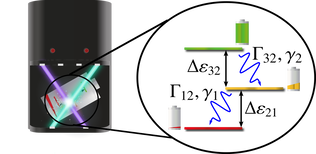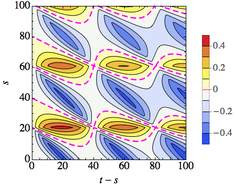|
Work Package 1: Quantum speed limits in thermodynamic processes
The steady miniaturisation of devices, along with the development of wholly new quantum technologies, has led to renewed interest in understanding the thermodynamics of quantum systems. The previously familiar concepts of work and heat are being re-examined when the working medium is genuinely quantum. By examining the flow of energy between quantum systems and their environments, while also assessing the build up of correlations between them, we have established meaningful definitions of thermodynamic quantities. How fast such a dynamic can occur has particular practical relevance which will be explored in two settings of broad importance: thermometry and information erasure. Accurately estimating the temperature is a ubiquitous task, and already quantum systems have been shown to be the ultimate probes. Similarly, processing information often comes with an inescapable energetic cost as dictated by Landauer’s bound. Interestingly this sets a fundamental limit the energy cost of an irreversible computation, however to date this limit appears only achievable when the process is performed relatively slowly. It is thus of huge practical relevance to develop fast schemes that nevertheless cost the minimal amount energetically, and therefore will have wide-reaching impact on potential computational models. Objective and impact: The main goal of WP1 is to analyse the way in which different forms of energy flow when a quantum system is in contact with its environment, with a particular emphasis on understanding the role and attainability of the quantum speed limit. |
Publications
- Collisional unfolding of quantum Darwinism
Steve Campbell, Barış Çakmak, Özgür E. Müstecaplıoğlu, Mauro Paternostro, and Bassano Vacchini
Phys. Rev. A 99, 042103 (2019) - Precursors of non-Markovianity
Steve Campbell, Maria Popovic, Dario Tamascelli, and Bassano Vacchini
New J. Phys. 21, 053036 (2019) - Stable adiabatic quantum batteries
Alan C. Santos, Barış Çakmak, Steve Campbell, and Nikolaj T. Zinner
Phys. Rev. E 100, 032107 (2019) - Thermalization of finite many-body systems by a collision model
Onat Arısoy, Steve Campbell, and Özgür E. Müstecaplıoğlu
Entropy 21, 1182 (2019) - Non-equilibrium steady-states of memoryless quantum collision models
Giacomo Guarnieri, Daniele Morrone, Barış Çakmak, Francesco Plastina, and Steve Campbell
Phys. Lett. A 383, 126576 (2020) - In-situ thermometry of a cold Fermi gas via dephasing impurities
Mark T. Mitchison, Thomás Fogarty, Giacomo Guarnieri, Steve Campbell, Thomas Busch, and John Goold
Phys. Rev. Lett. 125, 080402 (2020) - Action quantum speed limits
Eoin O'Connor, Giacomo Guarnieri, and Steve Campbell
Phys. Rev. A 103, 022210 (2021) - Quantum Darwinism in a composite system: Objectivity versus classicality
Barış Çakmak, Özgür E. Müstecaplıoğlu, Mauro Paternostro, Bassano Vacchini, and Steve Campbell
Entropy 23, 995 (2021) - Quantum Darwinism in a structured spin environment
Eoghan Ryan, Mauro Paternostro, and Steve Campbell
Phys. Lett. A 416, 127675 (2021) - Stochastic collisional quantum thermometry
Eoin O'Connor, Bassano Vacchini, and Steve Campbell
Entropy 23, 1634 (2021) - Diverging quantum speed limits: A herald of classicality
Pablo M. Poggi, Steve Campbell, and Sebastian Deffner
PRX Quantum 2, 040349 (2021) - Correlations, information backflow, and objectivity in a class of pure dephasing models
Nina Megier, Andrea Smirne, Steve Campbell, and Bassano Vacchini
Entropy 24, 304 (2022) - Robustness of Enhanced Shortcuts to Adiabaticity in Lattice Transport
Chris Whitty, Anthony Kiely, and Andreas Ruschhaupt
Phys. Rev. A 105, 013311 (2022) - Classical dissipative cost of quantum control
Anthony Kiely, Steve Campbell, and Gabriel T. Landi
Phys. Rev. A 106, 012202 (2022) - DQC1 as an Open Quantum System
Jake Xuereb, Steve Campbell, John Goold, and André Xuereb
Phys. Rev. A 107, 042222 (2023) - Thermometry of strongly correlated fermionic quantum systems using impurity probes
George Mihailescu, Steve Campbell, and Andrew K. Mitchell
Phys. Rev. A 107, 042614 (2023) - Robustness of controlled Hamiltonian approaches to unitary quantum gates
Eoin Carolan, Barış Çakmak, and Steve Campbell
Phys. Rev. A 108, 022423 (2023) - Fisher information rates in sequentially measured quantum systems
Eoin O'Connor, Steve Campbell, and Gabriel T. Landi
New J. Phys. 26, 033048 (2024) - First Passage Times for Continuous Quantum Measurement Currents
Michael J. Kewming, Anthony Kiely, Steve Campbell, and Gabriel T. Landi
Phys. Rev. A 109, L050202 (2024) - Universally Robust Quantum Control
Pablo M. Poggi, Gabriele De Chiara, Steve Campbell, and Anthony Kiely
Phys. Rev. Lett. 132, 193801 (2024)


